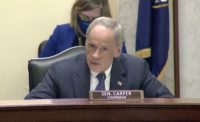Infrastructure advocates had to wait until President Trump was about an hour into his State of the Union address, but they finally heard what they were listening for: a “mention” about investing in public works. [View White House transcript of speech here.]
Trump said in his Feb. 4 speech before a joint session of Congress, “We must…rebuild America’s infrastructure.” Then he got more specific, calling on Congress to approve the highway authorization bill that the Senate Environment and Public Works Committee cleared unanimously on July 30.
Trump referred to the measure as “Senator John Barrasso’s highway bill,” which would “invest in new roads, bridges and tunnels across our land.”
In fact, the legislation was the result of a bipartisan effort in which Barrasso, a Republican from Wyoming, joined with the committee’s top Democrat, Tom Carper of Delaware.
It would authorize $287 billion over five years for highways, a figure that the committee said is a 27% increase over the current authorizations.
But it’s only a piece of what a full surface-transportation bill traditionally contains. Other Senate committees with jurisdiction over transit, highway safety, and—crucially—revenue have yet to write their sections of a possible transportation package.
A 27% increase in funding would require additional revenue, from somewhere.
Shortly after the speech, Barrasso issued a statement, saying, “The president spoke loud and clear tonight about putting partisan politics aside to pass a monumental American infrastructure plan.”
Barrasso called his committee’s bill “the largest highway infrastructure bill in our history,” and noted that it “cuts red tape so we can build better, smarter, faster and cheaper.”
Though the impeachment process had yet to conclude in the Senate, Barrasso said, “Impeachment has been a costly distraction “and called on lawmakers “to put the partisan fights behind us and get this done now.”
The president didn’t touch on such other types of infrastructure as drinking water, wastewater treatment, airports, rail and transit.
In the Democrats’ response , Michigan Gov. Gretchen Whitmer spent more time than Trump did on infrastructure.
She pointed to 13-year-old Monte Scott of Muskegon Heights, Mich., who, in Whitmer’s words, “grabbed a shovel and a bucket of dirt” and filled in the potholes on his street.
Whitmer cited Illinois Gov. J.B. Pritzker, who she said supported a major plan to upgrade highways and bridges, and New Jersey Gov. Phil Murphy, who proposed a plan to replace lead drinking-water pipes in his state.
Whitmer said, “Congressional Democrats have presented [infrastructure] proposals to keep us moving forward. But President Trump and Republicans in the Senate are blocking the path.”
A key House player on public works issues, Transportation and Infrastructure Committee Chairman Peter DeFazio (Ore.), also weighed in. In a post-State of the Union statement DeFazio criticized Trump for just touching on infrastructure in his speech.
He added, “That is incredibly disappointing,” saying that the lack of an administration infrastructure push “is a massive missed opportunity.”
DeFazio pointed out that House Democrats recently unveiled a $760-billion infrastructure framework that goes beyond highways to include other transportation sectors, along with non-transportation areas such as water and energy.
But the Democrats' framework also has a missing section—it also is silent on how to finance it.



